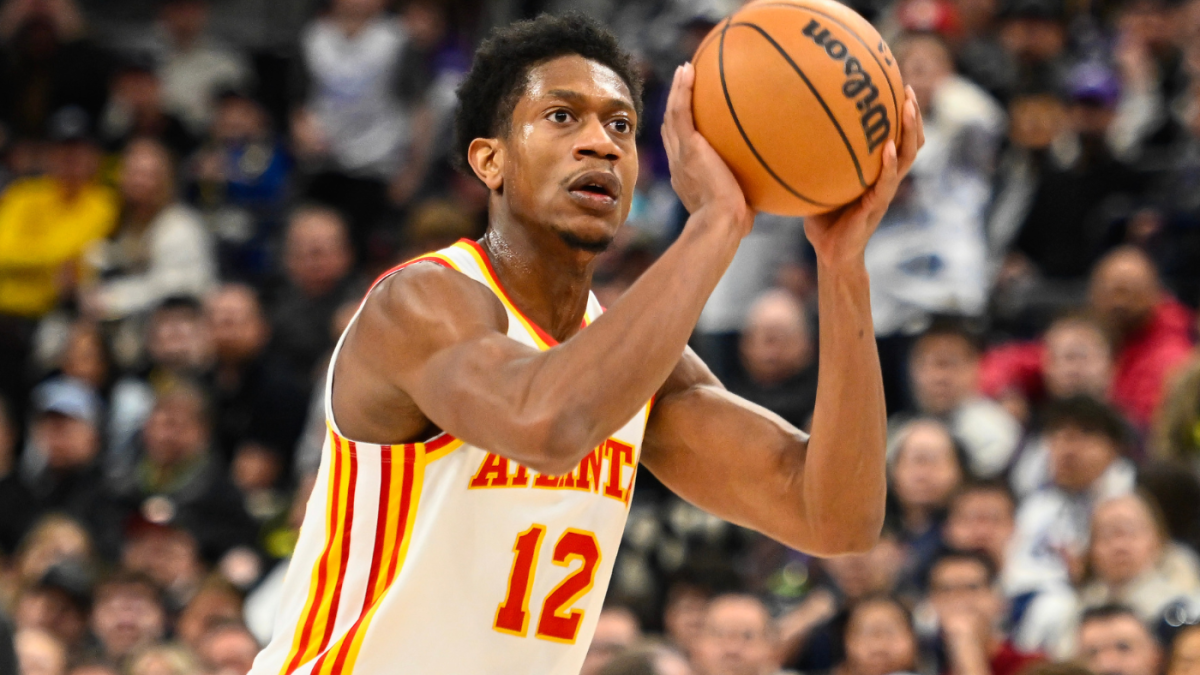The Cleveland Cavaliers are have acquired De’Andre Hunter from the Atlanta Hawks, according to ESPN’s Shams Charania. Cleveland will send out Caris LeVert, Georges Niang, three second-round picks and two first-round swaps in the deal.
Hunter was the No. 4 overall pick in the 2019 NBA Draft and landed in Atlanta on a draft night trade. A 6-foot-8 forward who specializes in shooting, Hunter has averaged 14.8 points for his career and is having his best season as a professional this year at 19 points per game. That success is coming on several levels offensively. He is shooting a career-best 39.3% from 3-point range this season while also setting career-highs in 2-point field goal percentage and free-throw rate. While Hunter’s defense has been inconsistent as a professional, he has good positional size and should be able to fit in well enough on a winning roster.
Cleveland obviously fits the bill. At 41-10, the Cavaliers are firmly in control of the No. 1 seed in the Eastern Conference, but they have been looking for wing depth for years now. This season, they’ve largely cultivated it. They are 30-5 with Dean Wade on the floor this season, but his history of injuries limits the amount of minutes he can play. Isaac Okoro is their younger, defensive-minded option at small forward, and Hunter would be the offensive side of that coin. With Max Strus also in place, Cleveland has a deep and versatile group of role players it can put in between Donovan Mitchell, Darius Garland, Evan Mobley and Jarrett Allen.
The Hawks, meanwhile, have cratered with star forward Jalen Johnson sidelined for the remainder of the season due to injury. They are 1-9 in their last 10 games, and with Hunter now gone as well, their once stellar group of young wings has been thinned dramatically. Losing doesn’t help the Hawks, as San Antonio controls their first-round pick, but Hunter has two more years left on his contract. This deal allows the Hawks to save money there that can be redirected elsewhere.
An important component of this deal is financial. The Cavaliers have ducked the luxury tax with this trade. Considering how much more punitive the repeater tax becomes starting next season, delaying their tax clock mattered quite a bit. As Cleveland is below the first apron, the Cavaliers are free to sign anyone available on the buyout market if they want to find more depth.
The Cavaliers were already the best team in the Eastern Conference, but they didn’t rest on the laurels at the trade deadline. Now they’re even scarier as the playoffs approach. Now, let’s grade this trade for both sides
Cavaliers: A-
The on-court cost here to Cleveland is minimal. Niang was inarguably the worst player in the rotation regularly, and his playoff struggles are well-known, so his absence won’t mean much when the games start to really count. If anything, the front office is almost protecting Kenny Atkinson from himself here. He likes to run very deep rotations, so depriving him of a player he might use in situations in which he shouldn’t is probably the right call.
Losing LeVert is a bit more of a loss. Part of what has made Cleveland’s offense so deadly this season is its wide array of viable shot-creators. But in the playoffs, offenses tend to consolidate around their best players. Did the Cavaliers really want LeVert leading possessions that could have gone to Mitchell, Mobley or Garland? Probably not. Honestly, Ty Jerome has been a better overall reserve guard than LeVert this season, and this trade is as much a vote of confidence in his performance as it is an investment in Hunter.
Getting Hunter just opens up a lot more lineup flexibility for the Cavaliers. Obviously, he is a potential closer alongside the four core players, and in moments in which they need shooting, he’ll be a clear candidate. But the more immediate benefit here is that he can play either forward position. While Wade can play power forward, he’s also an essential perimeter defender. Being able to slide Hunter in at power forward next to one of the big men or small forward with both of them is a pretty useful bit of optionality.
Ultimately this trade sets the Cavaliers up to either ride the hot hand or make decisions based on matchups in the playoffs. Wade, Hunter, Okoro, Strus and even Jerome are all viable closers in the right situations, and now Atkinson has a variety of different types of perimeter players to choose from based on what postseason opponents present him with. To get a player like Hunter without sacrificing a first-round pick or an essential part of the rotation is an obvious win for them.
If there’s one nit to be picked here, it’s that the Cavaliers look awfully expensive for next season. With Hunter replacing Niang on next year’s books, Cleveland is already bumping up against the projected second apron before even considering a new possible deal for Jerome. Cleveland is good enough to justify paying the second apron, but losing Jerome over the summer would sting. At that point, LeVert’s absence would be a bit more noticeable, but Cleveland can deal with the summer when it arrives. For now, they’ve improved their roster with a legitimate chance at a championship. That makes this a stellar trade for them.
Hawks: D-
It’s entirely possible that the San Antonio Spurs, who did not participate in this trade, got more value out of it than the Hawks did. Why? Because San Antonio controls Atlanta’s next three picks, and Hunter had been one of their best players this season. LeVert and Niang will play for them, but given how badly they’ve fallen apart without Johnson, it just looks like Atlanta’s pick is going to get worse and worse. The Hawks may have been uncomfortable with the two remaining years on Hunter’s contract, but having him around undeniably made them better. So that’s more value for San Antonio from a draft perspective. LeVert is on an expiring deal, while Niang has one year left.
The first-round swaps that the Hawks are getting here aren’t very valuable either. Cleveland’s 2026 and 2028 picks were already owed to Utah through swap rights from the Donovan Mitchell trade, so even if the Cavaliers fell apart in the near future, it would be Utah, not Atlanta, that was set to capitalize. Second-round picks are nice, but considering how well Hunter was playing, they should have at least been able to extract rookie Jaylon Tyson, if not Cleveland’s 2031 first-round pick. The Hawks got neither.
This is a pretty transparent cost-cutting maneuver on Atlanta’s part, and hey, in this new apron world we live in, cutting costs might be harder than it used to be. That doesn’t mean they should have sacrificed a Sixth Man of the Year candidate on a reasonable do for pennies on the dollar. The irony of this is that the Hawks did wind up taking back some longer-term money in their subsequent trade of Bogdan Bogdanovic to the Clippers for Terance Mann and Bones Hyland. Mann has three years and $47 million remaining on his deal and is having a pretty disappointing season, whereas Bogdanovic has just two years left on his deal, and the second is a team option. If the Hawks controlled their own first-round picks, getting worse just to save a bit of money might make sense. Obviously, they don’t, so this series of moves does little to improve their on-court prospects.



